|
|
|
Sort Order |
|
|
|
Items / Page
|
|
|
|
|
|
|
| Srl | Item |
| 1 |
ID:
154643
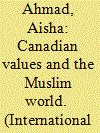

|
|
|
|
|
| Summary/Abstract |
The Canadian Charter of Rights and Freedoms constitutes the fundamental value system of our nation. The rise of anti-Muslim extremism thus presents a direct challenge to the core principles that define our liberal democracy. As our international order transforms, power polarities shift, and illiberal ideas spread across North America and Western Europe, maintaining commitment to these core Canadian values will become increasingly difficult. If our chief allies enact policies against their minority Muslim populations in the name of security, Canada will be put under pressure to do the same here at home, with devastating consequences for our democracy. Moreover, how Canada responds to the complex and multilayered crises that have gripped many parts of the modern Muslim world will have grave implications for both domestic and international security. Ideologically-motivated slogans do nothing to keep Canadians safe. It is therefore crucial that Canada continues to reject illiberal extremism and champions evidence-based international security policies, with a heavy investment in detailed ground-level analysis of these complex conflict theatres.
|
|
|
|
|
|
|
|
|
|
|
|
|
|
|
|
| 2 |
ID:
148452
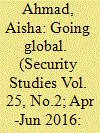

|
|
|
|
|
| Summary/Abstract |
The global landscape of modern jihad is highly diverse and wrought with conflict between rival Islamist factions. Within this inter-Islamist competition, some factions prove to be more robust and durable than others. This research proposes that the adoption of a global identity allows an Islamist group to better recruit and expand their domestic political power across ethnic and tribal divisions without being constrained by local politics. Islamists that rely on an ethnic or tribal identity are more prone to group fragmentation, whereas global Islamists are better able to retain group cohesion by purging their ranks of dissenters. To examine these two processes, I present original field research and primary source analysis to examine Islamist in-fighting in Somalia from 2006–2014 and then expand my analysis to Iraq and Syria, Pakistan, and Mali.
|
|
|
|
|
|
|
|
|
|
|
|
|
|
|
|
| 3 |
ID:
136640
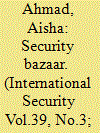

|
|
|
|
|
| Summary/Abstract |
In civil wars across the world, certain Islamist groups have competed exceptionally well against their rivals. The conventional wisdom points to either religion or ethnic politics to explain Islamist success. These ideological and identity-based explanations, however, tend to overlook the powerful economic influence that the local business class has over civil war outcomes. Civil war can be modeled as a MARKET for security, wherein protection must be purchased from multiple substate rackets. Using this market model, a close investigation of the Somali case reveals why and under what conditions the interests of the profit-driven business class align with those of ideologically motivated Islamist groups. Security costs are of critical importance to businesses in a civil war, and Islamists are uniquely competitive in lowering these costs. The business-Islamist alliance is therefore driven by rational, economic considerations, which can contribute to the rise of Islamist power.
|
|
|
|
|
|
|
|
|
|
|
|
|
|
|
|
| 4 |
ID:
155775
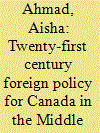

|
|
|
|
|
| Summary/Abstract |
The security crises facing the Middle East and North Africa are among the most complex and volatile in the world today. These protracted conflicts are shaped by a range of catalysts, including state failure, environmental stress, entrenched criminal war economies, ethnic and tribal hostilities, and ideological extremism. Not only are these highly fragmented conflicts, but the multiple actors in each of these theatres also have transnational linkages that trigger contagion effects across state borders. To understand these new twenty-first century security crises, scholars and policy practitioners alike require modern analytical tools. Gone are the days when Canadian foreign policy experts could rely on classic state-based models to explain and predict global violence. To address these contemporary challenges, Canada must adopt a forward-looking approach to the Middle East and North Africa, which does not shy away from the compound and multidimensional challenges that these complex environments present.
|
|
|
|
|
|
|
|
|
|
|
|
|
|
|
|
| 5 |
ID:
167614
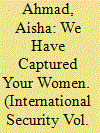

|
|
|
|
|
| Summary/Abstract |
In recent years, jihadists across the world have transformed their gendered violence, shocking the world by breaking from prior taboos and even celebrating abuses that they had previously prohibited. This behavior is surprising because jihadists represent a class of insurgents that are deeply bound by rules and norms. For jihadists, deviating from established Islamist doctrines is no easy feat. What then explains these sudden transformations in the rules and norms governing jihadist violence? An inductive investigation of contemporary jihadist violence in Pakistan and Nigeria reveals a new theory of jihadist normative evolution. Data from these cases show that dramatic changes in jihadist violence occur when an external trigger creates an expanded political space for jihadist entrepreneurs to do away with normative constraints on socially prohibited types of violence. As these jihadist leaders capitalize on the triggers, they are able to encourage a re-socialization process within their ranks, resulting in the erosion of previously held taboos, the adoption of proscribed behaviors, and the emergence of toxic new norms.
|
|
|
|
|
|
|
|
|
|
|
|
|
|
|
|
|
|
|
|
|